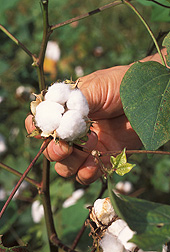This page has been archived and is being provided for reference purposes only. The page is no longer being updated, and therefore, links on the page may be invalid.
|
|
Cotton DNA Database Launched to Help Find Plant Resistance
By Jim CoreAugust 16, 2005
The Agricultural Research Service has joined Cotton Incorporated (CI) and Clemson University Genomics Institute (CUGI) today in launching the Cotton Microsatellite Database online at:
www.mainlab.clemson.edu/cmd
Unlike other major crops, cotton did not have a publicly available database for DNA markers. Lack of markers and maps has been a major limiting factor in the development of DNA-based tools to identify important agronomic traits and facilitate selection of plants based on these traits.
|
|
DNA markers are small pieces of DNA that vary in length, depending on the plant's genetic make-up. When a specific marker is associated with a gene governing resistance to a specific pest or disease, it can be used as a diagnostic tool to identify plants with potential resistance.
In Stoneville, Miss., geneticist Jodi Scheffler, in the ARS Crop Genetics and Production Research Unit, and molecular biologist Brian Scheffler, from the agency's Mid-South Area Genomics Laboratory, teamed up with grower-funded CI in Cary, N.C., and CUGI in South Carolina to develop a DNA marker database for cotton.
CI funded the database with coordination from its vice president of agricultural research, Roy Cantrell. Dorrie Main and co-workers at CUGI developed the database. The Stoneville scientists are evaluating potential DNA markers and working with CUGI to test the database.
To facilitate comparison of marker data from different research groups, a standardized set of DNA from a range of cotton varieties and wild species is being maintained by ARS geneticist John Yu in the Crop Germplasm Research Unit at College Station, Texas. ARS geneticist Johnie Jenkins and colleagues in the Genetics and Precision Agriculture Research Unit at Mississippi State, Miss., have also contributed markers being tested at Stoneville. Other ARS locations, public universities, research laboratories in France and China, and cotton-breeding companies plan to contribute markers and information to the database.
This is only the first step toward developing a DNA marker database and creating a map of the cotton genome.
ARS is the U.S. Department of Agriculture's chief scientific research agency.


